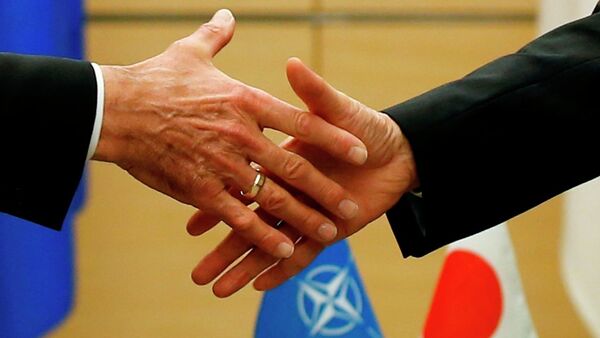According to a Reuters report, Japanese officials are considering taking part in a 12-country NATO missile-building consortium, which could be the country’s first international defense project.
The NATO consortium manages the production and development of Sea Sparrow ship-borne missiles that are designed to destroy anti-ship sea-skimming missiles and attack opposition aircraft.
VIDEO: #Japan is interested in joining a NATO… http://t.co/97YgCnRh8k pic.twitter.com/GFnmJy90bB
— Trending NATO News (@NATOlizer) July 10, 2015
Cooperation on the project is shared between Belgium, Canada, Denmark, Germany, Greece, The Netherlands, Norway, Portugal, Spain, Turkey, the US and Australia, who is currently the only non-NATO member of the group.
Citing a US source, Reuters reported that two Japanese naval officers discussed their country’s potential participation in the consortium during a trip to The Hague in May.
Japan’s Strategic Position
While the inclusion of Japan in such a consortium would spread the costs of the project, the enthusiasm from US officials to get Tokyo on board is thought to be down to greater strategic geopolitical goals.
As a key ally of Washington, many commentators have pointed out that the US believes Japan can play a significant role in a number of multinational military partnerships across Asia, particularly amid US concerns over China, given its military modernization and its assertive nature across many countries in the region.
"We think this project will allow Japan to lay the groundwork for further defense export programs in the future," the US source said. "We would welcome this kind of security cooperation activity by Japan in the region."
Abe’s Defensive Shift
The reports suggesting Japan is considering taking part in the NATO consortium have been seen by many as another step in Prime Minister Shinzo Abe’s policy of increasing defense cooperation.
Since returning as PM in late 2012, Abe has overseen a number of research and development and production cooperation projects with countries such as the US, UK, France and Australia by lifting Japan’s decades-long self-imposed arms export ban.
The ban, based on three principles, previously prohibited Tokyo from exporting arms to communist states, states involved in conflict or those subject to UN embargoes.
If Japan does join the NATO consortium, it would increase the alliance’s influence beyond Western Europe and North America, with NATO recently bulking up its Eastern European military resources to combat the perceived threat of Russia.




